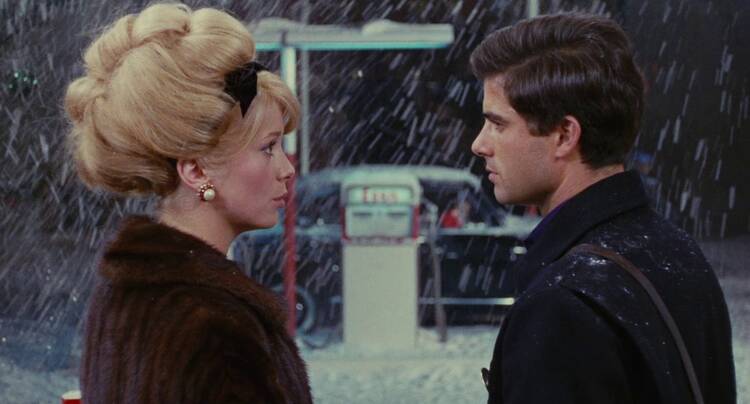August is Musical Month in Catholic Movie Club! We’re going to look at movie musicals from across the history of the genre to see how these song-and-dance spectaculars can teach us about our faith.
Musicals take place in a heightened version of reality. In real life when you fall in love, you realize it quietly, internally; in a musical you burst into song. The dance floor at a real wedding (in my experience) features a lot of aimless grooving and mild hip gyrations; at a wedding in a musical, the crowd erupts into perfectly coordinated choreography, dozens of bodies moving in joyous unison. A musical takes familiar emotions and situations and dials them all the way up, presenting a vision of life that is both wildly exaggerated and somehow truer than true.
In “The Umbrellas of Cherbourg” (1964), written and directed by Jacques Demy, the ordinary becomes operatic and the everyday becomes extraordinary. Through the power of music and film, Demy imbues the story’s unremarkable events with transcendent beauty. Which raises the question: If the transcendent can be found in the ordinary, is it really that ordinary at all?
The story is so commonplace that, in real life, it wouldn’t rise above the level of local gossip: Two young lovers, Geneviève (Catherine Deneuve) and Guy (Nino Castelnuovo), living in the port town of Cherbourg, plan to marry, but they are separated when Guy is drafted for two years of service in the Algerian War. After he leaves, Geneviève discovers that she is pregnant. Her mother (Anne Vernon) is struggling financially and encourages Geneviève to entertain a marriage proposal from the wealthy Roland (Marc Michel). With Guy’s situation (and survival) uncertain, Geneviève must choose between romance and practicality.
But Demy elevates this story to the realm of epic romance. Every line in the film is sung, over Michel Legrand’s lush score. Traditional musicals reserve songs for major story and character moments, but Demy and Legrand render every word as music, even the most mundane: a mailman’s delivery, co-worker banter, “Did you have dinner?” Blue-collar Cherbourg becomes a fanciful place where color explodes from every brick and scrap of wallpaper (all gorgeously filmed in Technicolor by cinematographer Jean Rabier). Inspired by the sensational MGM musicals of Hollywood’s golden age, Demy uses their techniques to reveal that the stories of everyday people can be just as powerful as those of stars and heroes.
“The Umbrellas of Cherbourg” reminded me of the work of another Frenchman, the Jesuit scientist and theologian Pierre Teilhard de Chardin. In particular I thought of his book The Divine Milieu (published in 1957, two years after his death—and, coincidentally, the same year that “The Umbrellas of Cherbourg” begins) and its treatment of “the sanctification of human endeavor.”
Teilhard examines the presumed separation between our daily lives (filled with work and family obligations) and our spiritual lives (those couple of precious hours each week when we have time for Mass, the sacraments or sustained prayer) and rejects it. He writes: “By virtue of the Creation and, still more, of the Incarnation, nothing here below is profane for those who know how to see” (emphasis his). He goes on: “[T]ry to realize that heaven itself smiles upon you and, through your works, draws you to itself; then, as you leave church for the noisy streets, you will remain with only one feeling, that of continuing to immerse yourself in God.”
To Teilhard, even our most mundane, unremarkable activity can be suffused with the sacred—if we have the eyes to see. “The Umbrellas of Cherbourg” presents the world through this graced lens, with its ordinary joys and sorrows becoming the stuff of legends. It is an exaggeration but it is also, as I said above, truer than true. When your heart breaks it feels like the first time anyone’s heart has ever broken, even though you know that’s not true. When your heart flares with joy it’s like you can hear the entire universe singing in harmony, just for you. Musicals, for all of their spectacle and stylization, tell us something important about reality: that we experience the transcendent in the streets we walk each day, the people we encounter, the activities that occupy our short lives.
“The Umbrellas of Cherbourg” reminds us that life is beautiful because it is ordinary. How can we keep from singing?
“The Umbrellas of Cherbourg” is streaming on Max, the Criterion Channel and Kanopy.








